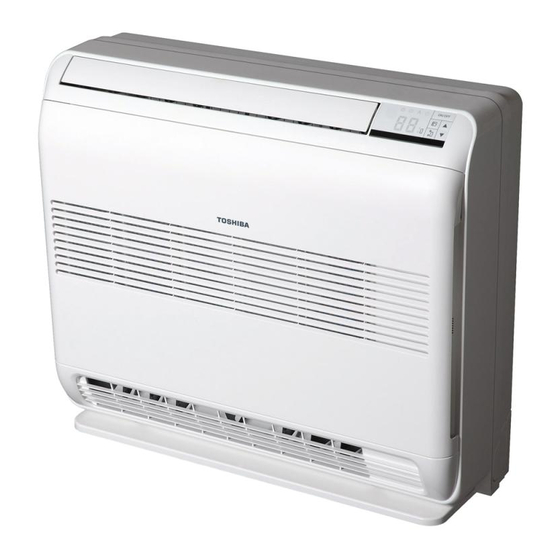Toshiba 35S3AVP-ND Installationshandbuch - Seite 9
Blättern Sie online oder laden Sie pdf Installationshandbuch für Klimagerät Toshiba 35S3AVP-ND herunter. Toshiba 35S3AVP-ND 40 Seiten.
Auch für Toshiba 35S3AVP-ND: Benutzerhandbuch (24 seiten)

(Front view)
800 or more
50 or more
• When using a multi-system outdoor unit refer to the installation manual
provided with the model concerned.
Installation Place
• A place which provides enough spaces around the outdoor unit as shown
in the diagram.
• A place which can bear the weight of the outdoor unit and does not allow
an increase in noise level and vibration.
• A place where the operation noise and discharged air do not disturb your
neighbors.
• A place which is not exposed to a strong wind.
• A place free of a leakage of combustible gases.
• A place which does not block a passage.
• When the outdoor unit is to be installed in an elevated position, be sure to
secure its feet.
• An allowable length of the connecting pipe is up to 25 m.
• There is no need to add refrigerant as long as the length of the
connection piping is 15 m or less.
• You will need to add 20 g of refrigerant per meter of added connection
piping for installation requiring connection piping to be between 16 m to
25 m.
• An allowable height level is up to 10 m.
• A place where the drain water does not cause any problems.
Precautions about Installation in Regions
with Snowfall and Cold Temperatures
• Do not use the supplied drain nipple for draining water. Drain the water from
all the drain holes directly.
• To protect the outdoor unit from snow accumulation, install a holding frame,
and attach a snow protection hood and plate.
* Do not use a double-stacked design.
Snow protection plate
Snow protection hood
Front
At least 50 cm
Snow accumulation line
Anchor bolts
Holding frame
CAUTION
1. Install the outdoor unit in a location where there are no obstructions
near its air intake or air outlet.
2. When the outdoor unit is installed in a place that is always exposed to
strong winds like on the coast or on a high story of a building, secure
the normal fan operation using a duct or a wind shield.
3. Especially in windy areas, install the unit to prevent the admission of
wind.
4. Installation in the following places may result in trouble.
Do not install the unit in such places.
• A place full of machine oil.
• A saline-place such as the coast.
• A place full of sulfi de gas.
• A place where high-frequency
waves are likely to be generated,
such as from audio equipment, welders, and medical equipment.
70 or more
Opening for receiver
Partition board
50 or more
OUTDOOR UNIT
OUTDOOR UNIT
Install at least 50 cm
above the snow
accumulation line.
Strong
wind
7
(Side view)
Refrigerant Piping Connection
Flaring
1. Cut the pipe with a pipe cutter.
2. Deburr the inside of the pipe at its end.
Take steps to ensure that the removed burrs will not enter the pipe.
3. Remove the fl are nuts provided with the indoor and outdoor units, and
insert them into the pipe.
4. Flare the pipe.
The projection margin of the pipe must be checked.
5. Check that the fl are has the appropriate shape.
90
A
Die
Pipe
Pipe
A
Imperial
Rigid
Outside
(wing nut
Thickness
(clutch type)
diameter
type)
R410A tool
R410A tool
mm
mm
mm
mm
6.35
0.8
0 to 0.5
1.5 to 2.0
9.52
0.8
0 to 0.5
1.5 to 2.0
12.7
0.8
0 to 0.5
2.0 to 2.5
• Tightening torque for connection of fl are pipe
The pressure of R410A is higher than R22
(Approx. 1.6 times). Therefore securely
tighten the fl are pipes which connect the
outdoor unit and the indoor unit with the
specifi ed tightening torque using a torque
wrench. If any fl are pipe is incorrectly
connected, it may cause not only
a gas leakage but also trouble in the
refrigeration cycle.
Opening for receiver
20 to 30
Partition board
Obliquity
Roughness
Warp
B
C
B
Flare Nut
C
Tighten torque
mm
mm
N·m
kgf·m
9.1
17
14 to 18
1.4 to 1.8
13.2
22
33 to 42
3.3 to 4.2
16.6
26
50 to 62
5.0 to 6.2
Flare at
indoor unit side
Flare at
outdoor unit side
EN
SV
FI
NO
